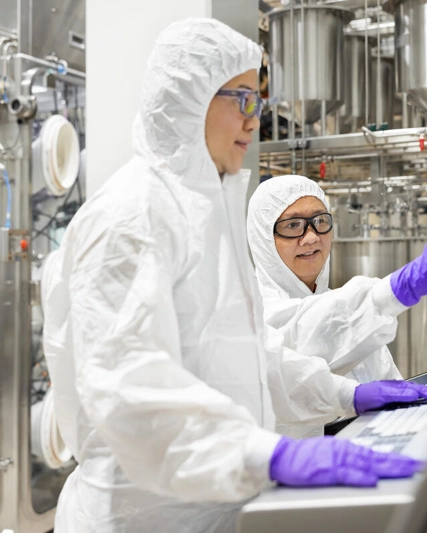Issued: London, UK
For media and investors only
GSK highlights new data in non-small cell lung cancer and endometrial cancer at the European Society for Medical Oncology (ESMO) Congress 2023, reinforcing potential of Jemperli (dostarlimab) as a backbone immuno-oncology therapy
- Late-breaking data from head-to-head PERLA trial shows favourable numerical trend in overall survival (OS) results for Jemperli (dostarlimab) plus chemotherapy vs. pembrolizumab plus chemotherapy in first-line metastatic non-squamous non-small cell lung cancer (NSCLC)
- New exploratory analysis of RUBY trial shows progression-free survival (PFS) and OS outcomes in primary advanced or recurrent endometrial cancer according to molecular classification
GSK plc will present data at the ESMO Congress 2023 (20-24 October) focusing on Jemperli (dostarlimab) and Zejula (niraparib) that further demonstrate advancements in immuno-oncology and gynaecologic cancers and improving patient outcomes.
Advancing research for patients with NSCLC
GSK will share updates from the PERLA trial evaluating dostarlimab plus chemotherapy versus pembrolizumab plus chemotherapy in the first-line treatment of metastatic non-squamous NSCLC. Expanding upon the primary data presented at the ESMO Immuno-Oncology Congress 2022, late-breaking results at ESMO 2023 (LBA64) will highlight a positive numerical trend in OS outcomes, favouring dostarlimab plus chemotherapy vs. pembrolizumab plus chemotherapy. The PERLA phase II trial is a randomised, double-blind trial of 243 patients and is the largest global head-to-head trial of programmed death receptor-1 (PD-1) inhibitors in this patient population.
In the PERLA trial, the median OS for patients receiving dostarlimab plus chemotherapy was 19.4 months (95% CI: 14.5-NR) versus 15.9 months (95% CI: 11.6-19.3) for patients receiving pembrolizumab plus chemotherapy, after a median follow-up of 20.7 months (17.3-24.0) and 21.6 months (18.3-24.1), respectively (HR: 0.75: [95% CI: 0.53-1.05]). An additional analysis with greater OS maturity is planned and will be reported at a later date. Safety profiles in this secondary analysis were similar and consistent with those previously reported in the primary analysis for the PERLA trial.
Data from PERLA supports the company’s ambition for dostarlimab to become its backbone immuno-oncology therapy when used alone and in combination with standard of care and future novel cancer therapies.
Updates from the RUBY clinical trial
GSK will also present updates from Part 1 of the phase III RUBY clinical trial evaluating dostarlimab in combination with chemotherapy compared to standard of care chemotherapy in patients with primary advanced or recurrent endometrial cancer. During a mini oral presentation (740MO), results from an exploratory analysis of the RUBY trial will show the effect of dostarlimab plus chemotherapy on PFS and OS across molecular classifications initially defined by The Cancer Genome Atlas, including mismatch repair deficient (dMMR)/microsatellite instability-high (MSI-H), no specific molecular profile (NSMP) and tumour protein 53 aberrant (TP53mut) subgroups.
In the analysis, PFS and OS results favoured patients treated with dostarlimab plus chemotherapy in the dMMR/MSI-H, TP53mut and NSMP subgroups, with the largest benefit observed in the dMMR and TP53mut groups. This exploratory analysis will provide insights into how molecular classification may help further the understanding of which patients are most likely to derive benefit from treatment.
GSK will also present results (750P) from the RUBY trial focusing on investigator-assessed progression-free survival 2 (PFS2). PFS2 is a secondary endpoint for the trial, defined as the time from treatment randomisation to progression on the first subsequent anticancer therapy following study treatment or death by any cause. The presentation will also include OS results after adjustment for subsequent use of immuno-therapy (dostarlimab, pembrolizumab, durvalumab, nivolumab or pembrolizumab with lenvatinib). The results show PFS benefits are sustained beyond first progression and further support the OS benefits in patients treated with dostarlimab plus chemotherapy vs. chemotherapy alone despite the use of subsequent therapies.
Safety profiles in both analyses were similar and consistent with those previously reported for the RUBY trial.
Exploring real-world experience with first-line maintenance therapy in ovarian cancer
Presentation of an analysis (789P) of real-world data of patients with epithelial ovarian cancer, obtained from a national United States electronic healthcare record-derived de-identified database, will shed new light on treatment duration and causes of discontinuation among individuals receiving niraparib in the first-line maintenance setting. The analysis found that patients with epithelial ovarian cancer who are taking first-line maintenance niraparib for more than 90 days have a longer time to treatment discontinuation than all other patients in the analysis. Findings will contribute to the understanding of effective clinical management of toxicity early in the maintenance period, which may help patients stay on treatment and experience the full therapeutic benefit of niraparib.
Collaborating to improve patient care
GSK is supporting investigator-sponsored studies and fostering scientific collaborations with both experienced investigators and networks, who are involved in the continuum of care of patients living with cancer. In addition to GSK’s presentations at ESMO, there will be seven additional GSK-supported investigator-sponsored study presentations.
Full list of GSK’s presentations at ESMO:
| Abstract Name | Presenter | Presentation Details |
|---|---|---|
| Overall survival from a phase II randomised double-blind trial (PERLA) of dostarlimab (dostar) + chemotherapy (CT) vs pembrolizumab (pembro) + CT in metastatic non-squamous NSCLC | S. Peters | LBA64 |
| Dostarlimab + chemotherapy for the treatment of primary advanced or recurrent endometrial cancer (pA/rEC): analysis of progression free survival (PFS) and overall survival (OS) outcomes by molecular classification in the ENGOT-EN6-NSGO/GOG-3031/RUBY trial | M. Mirza | 740MO |
| PFS2 and adjustment of overall survival (OS) for subsequent anticancer therapy in patients (pts) with primary advanced or recurrent endometrial cancer (pA/rEC) treated with dostarlimab plus chemotherapy or chemotherapy alone in the ENGOT-EN3-NSGO/GOG-3031/RUBY trial | B. Slomovitz | 750P |
| Patient-reported outcomes (PROs) in patients (pts) with mismatch repair deficient (dMMR)/microsatellite instability-high (MSI-H) primary advanced or recurrent endometrial cancer (pA/rEC) in the ENGOT-EN6-NSGO/GOG3031/RUBY trial | G. Valabrega | 749P |
| Real-world (RW) duration of treatment in first-line maintenance (1Lm) niraparib monotherapy in epithelial ovarian cancer (EOC): CHAR1ZMA study | F. Backes | 789P |
| Patients’ perspective on tolerability of dostarlimab in NSCLC: patient-reported outcomes from the phase II PERLA trial | M. Reck | 1468P |
Full list of collaborative studies at ESMO:
| Abstract Name | Presenter | Presentation Details |
|---|---|---|
| Atezolizumab (atezo) combined with platinum-based chemotherapy (CT) and maintenance niraparib for recurrent ovarian cancer (rOC) with a platinum-free interval (TFIp) >6 months: Primary analysis of the double-blind placebo (pbo)-controlled ENGOT-Ov41/GEICO 69-O/ANITA phase 3 trial | A. Gonzalez-Martin | LBA37 |
| Niraparib (NIRA) with abiraterone acetate plus prednisone (AAP) as first-line (1L) therapy in patients (pts) with metastatic castration-resistant prostate cancer (mCRPC) and homologous recombination repair (HRR) gene alterations: Three-year update and final analysis (FA) of MAGNITUDE | K. Chi | LBA85 |
| Patients with endometrial cancer: expectations and understanding of genetic counseling and hereditary carcinomas – first results of an international NOGGO/GCIG/ENGOT survey (EXPRESSION XI / IMPROVE) | J. Sehouli | 751P |
| Tolerability and effectiveness of niraparib in long-term responders with platinum-sensitive recurrent ovarian cancer (GEICO-88R study) | J. Cueva | 795P |
| Efficacy of niraparib and abiraterone acetate plus prednisone (NIRA+AAP) in homologous recombination repair gene-altered (HRR+) metastatic castration-resistant prostate cancer (mCRPC) by tissue and/or plasma assays in the MAGNITUDE trial | G. Attard | 1806P |
| A prospective study to determine the prevalence of DNA repair defects in patients (pts) with advanced prostate cancer (PC) | S. Sandhu | 1835P |
| PARPiPANC - A multicentric, single arm, phase II assessing niraparib as first line therapy for patients with metastatic homologous repair-deficient pancreatic cancer | P. Cassier | 1684TiP |
About PERLA
The PERLA phase II trial is a global, randomised, double-blind trial of 243 patients evaluating the efficacy and safety of dostarlimab plus chemotherapy versus pembrolizumab plus chemotherapy in patients with metastatic non-squamous NSCLC without a known sensitising epidermal growth factor receptor, anaplastic lymphoma kinase, or receptor tyrosine kinase-1 mutation V600E mutation of the BRAF gene or other genomic mutation for which an approved targeted therapy is available. The primary endpoint is objective response rate of dostarlimab plus chemotherapy versus pembrolizumab plus chemotherapy assessed by blinded independent central review per RECIST v1.1. Secondary endpoints include investigator-assessed progression-free survival per RECIST v1.1, overall survival, and safety.
About RUBY
RUBY is a two-part global, randomised, double-blind, multicentre phase III trial of patients with primary advanced or recurrent endometrial cancer. Part 1 is evaluating dostarlimab plus carboplatin-paclitaxel followed by dostarlimab versus carboplatin-paclitaxel plus placebo followed by placebo. Part 2 is evaluating dostarlimab plus carboplatin-paclitaxel followed by dostarlimab plus niraparib versus placebo plus carboplatin-paclitaxel followed by placebo.
The dual-primary endpoints in Part 1 are investigator-assessed PFS based on the Response Evaluation Criteria in Solid Tumours v1.1 and OS. The statistical analysis plan included pre-specified analyses of PFS in the dMMR/MSI-H and ITT populations and OS in the overall population. Pre-specified exploratory analyses of PFS in the mismatch repair proficient (MMRp)/microsatellite stable (MSS) population and OS in the dMMR/MSI-H populations were also performed. RUBY Part 1 included a broad population, including histologies often excluded from clinical trials and had approximately 10% of patients with carcinosarcoma and 20% with serous carcinoma. In Part 2, the primary endpoint is investigator-assessed PFS, with OS as a key secondary endpoint. Secondary endpoints in Part 1 and Part 2 include PFS per blinded independent central review, overall response rate, duration of response, disease control rate, patient-reported outcomes, and safety and tolerability.
About Jemperli (dostarlimab)
Jemperli is a programmed death receptor-1 (PD-1)-blocking antibody that binds to the PD-1 receptor and blocks its interaction with the PD-1 ligands PD-L1 and PD-L2.[1]
In the US, Jemperli is indicated in combination with carboplatin and paclitaxel, followed by Jemperli as a single agent for the treatment of adult patients with primary advanced or recurrent endometrial cancer that is mismatch repair deficient (dMMR), as determined by an FDA-approved test, or microsatellite instability-high (MSI-H), and as a single agent for adult patients with mismatch repair-deficient (dMMR) recurrent or advanced endometrial cancer, as determined by a US FDA-approved test, that has progressed on or following a prior platinum-containing regimen in any setting and are not candidates for curative surgery or radiation. The sBLA supporting the new indication in combination with carboplatin and paclitaxel received Breakthrough Therapy designation from the FDA. Jemperli is also indicated in the US for patients with dMMR recurrent or advanced solid tumours, as determined by a US FDA-approved test, that have progressed on or following prior treatment and who have no satisfactory alternative treatment options. The latter indication is approved in the US under accelerated approval based on tumour response rate and durability of response. Continued approval for this indication in solid tumours may be contingent upon verification and description of clinical benefit in a confirmatory trial(s).
Jemperli was discovered by AnaptysBio, Inc. and licensed to TESARO, Inc., under a collaboration and exclusive license agreement signed in March 2014. The collaboration has resulted in three monospecific antibody therapies that have progressed into the clinic. These are: Jemperli (GSK4057190), a PD-1 antagonist; cobolimab, (GSK4069889), a TIM-3 antagonist; and GSK4074386, a LAG-3 antagonist. GSK is responsible for the ongoing research, development, commercialisation, and manufacturing of each of these medicines under the agreement.
Important Information for Jemperli in the EU
Indication
Jemperli is indicated as monotherapy for treating adult patients with mismatch repair deficient (dMMR)/microsatellite instability-high (MSI-H) recurrent or advanced endometrial cancer that has progressed on or following prior treatment with a platinum-containing regimen.
Refer to the Jemperli EMA Reference Information for a full list of adverse events and the complete important safety information in the EU.
GSK in oncology
GSK is committed to maximising patient survival through transformational medicines, with a current focus on breakthroughs in immuno-oncology and tumour-cell targeting therapies, and development in haematologic malignancies, gynaecologic cancers and other solid tumours.
About GSK
GSK is a global biopharma company with a purpose to unite science, technology, and talent to get ahead of disease together. Find out more at gsk.com.
Cautionary statement regarding forward-looking statements
GSK cautions investors that any forward-looking statements or projections made by GSK, including those made in this announcement, are subject to risks and uncertainties that may cause actual results to differ materially from those projected. Such factors include, but are not limited to, those described under Item 3.D 'Risk factors” in the company's Annual Report on Form 20-F for 2022, and Q2 Results for 2023 and any impacts of the COVID-19 pandemic.
References
- Laken H, Kehry M, Mcneeley P, et al. Identification and characterization of TSR-042, a novel anti-human PD-1 therapeutic antibody. European Journal of Cancer. 2016;69,S102. doi:10.1016/s0959-8049(16)32902-1.


